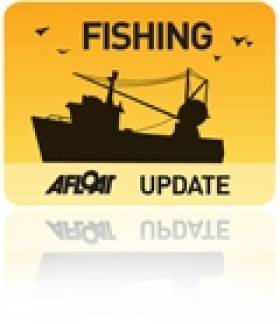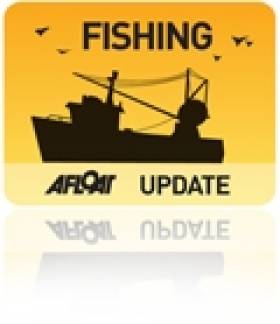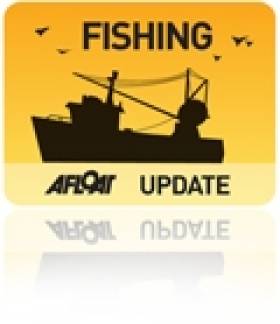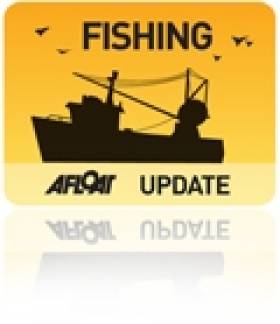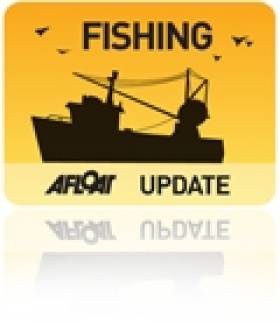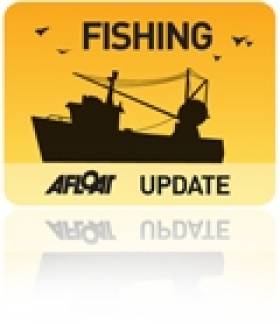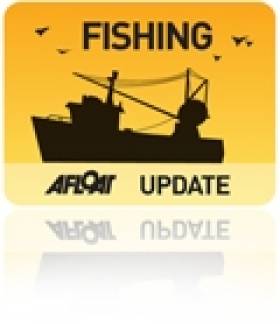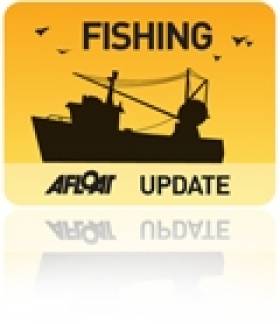Displaying items by tag: Common Fisheries Policy
#fishing – Minister Simon Coveney was guest speaker today at the 9th North Atlantic Seafood Forum in Bergen, Norway. The Minister was invited to speak to open the plenary session of the forum on the importance of seafood for global food security. The Minister was also invited to address the Global Fisheries Policy & Management seminar at the Forum on the new reformed EU Common Fisheries Policy and its impact on the seafood industry. The new Common Fisheries Policy was negotiated to conclusion by the Irish Presidency in 2013. Minister Coveney was the only EU Fisheries Minister to be invited to speak at this prestigious event.
Minster Coveney, along with BIM and representatives of the Irish seafood industry also took the opportunity to meet with a number of major Norwegian seafood companies with a view to broadening and deepening cooperation to the mutual benefit of the Norwegian and Irish seafood sectors. The Minister also had a fruitful bilateral meeting with his Norwegian counterpart where they discussed issues of common interest, including the ongoing negotiations on North East Atlantic Mackerel which is of such importance to both countries.
Minister Coveney said "I have a passionate interest in how we manage the oceans and coastal areas for the benefit of future generations and that's why I was delighted to accept the invitation to speak here today. The importance of the opportunities afforded by sustainable aquaculture and sustainable sea fisheries in contributing to global food security cannot be underestimated. Those opportunities are indeed vast and provide a huge opportunity for delivering economic growth and jobs in the seafood sector."
Brussels Reaches Agreement On European Fisheries Fund
#Fishing - Draft rules for allocating European Maritime and Fisheries Fund (EMFF) aid to help fishermen comply with the new Common Fisheries Policy (CFP) requirements were informally agreed late last month, after several three-way meetings between European Parliament, Council and Commission.
The rules should now be approved at the first reading, before the end of the current parliament.
"This was the final chapter of the negotiations," said rapporteur Alain Cadec. "With the political agreement reached tonight we will have an ambitious European Maritime and Fisheries Fund for 2014-2020. This is a real victory for the European Parliament, which was heeded by the Council and the Commission.
"The tug of war between the institutions in December allowed Parliament to return to the negotiating table with a strong position and reach a very satisfactory agreement regarding in particular the financial breakdown and engine renewal."
Parliament’s negotiators improved the Commission proposal, especially on collecting and managing fisheries data, which are needed for example, to set the Maximum Sustainable Yield required by the new CFP rules (MSY, meaning the largest catch that can be safely taken year after year and which maintains the fish population size at maximum productivity).
MEPs ensured that €520 million - a considerable increase over the original Commission proposal - of the EMFF budget will be earmarked for data collection.
Another negotiating success for Parliament was to require each member state with a significant small-scale coastal fishing fleet to table an action plan setting out a strategy for the development, competitiveness and sustainability of these fisheries, which play a key role in ensuring the vitality of coastal areas.
MEPs also amended the EMFF proposal to allow fishermen under 40 years old to be granted up to €75,000 in individual start-up support if they buy a small-scale and coastal fishing vessel between 5 and 30 years old and have five years' professional experience in the sector.
In addition, Parliament added EMFF support for withdrawing, replacing or modernising engines for vessels up to 24 metres long, including an requirement for those of 12-24 metres that the new engine's power output be less than that of the engine it replaces. However, an amendment to reintroduce fleet renewal subsidies was rejected.
To give effect to Parliament's agreement with the Council on the forthcoming CFP, which obliges member states to set sustainable fishing quotas from 2015 and introduces a ban on discarding unwanted fish, the EMFF will help fishermen to comply with the new rules by supporting investments in more selective fishing gear or equipment to facilitate handling, landing and storage of unwanted catches.
EMFF aid will also be used to improve safety and working conditions, data collection and port infrastructure.
After a plenary vote in October to open negotiations with the Council, the agreement will now be put to a vote in the Fisheries Committee before seeking final approval by the full House in April.
EU Parliament to Vote on New Common Fisheries Policy
#ReformedCFP- By coincidence on today's public auction of decommissioned L.E. Emer, which carried out countless fishery maritime patrols, MEP's are to vote on the EU's new policy of the European Maritime and Fisheries Fund (EMFF): 2014-2020, writes Jehan Ashmore.
The EMFF is the third and final legislative file in the reform of the common fisheries policy (CFP) which has seen the fishing industry particularly dependent on subsidies down through the years.
The subsidies account for 40% of the landing price accounted for from both direct and indirect public funded monies. The upgrading of existing boats and new vessels provided by grants further accentuates problems by impacting on reducing fish stocks.
The Environmental Pillar are calling on MEP's to end years of over-fishing in the industry which has progressively led to lost jobs due to subsidiary-driven growth and renovation of the EU's trawler fleet.
The umbrella group comprises 26 national environmental organizations that campaign to protect and enhance the environment and also promote economic creation through sustainable eco-systems.
In addition Environmental Pillar are seeking increased financial aid to gather data collection, control and enforcement of the industry.
Among those making up the diverse group are: An Taisce, CoastWatch, Irish Whale & Dolphin Group, Irish Doctors' Environmental Association, Irish Natural Forestry Foundation and Zero Water Tolerance.
CFP Reform Reaches Final Hurdle In Brussels
#CFP - RTÉ News reports that the "final battle" before reform of the Common Fisheries Policy (CFP) comes up today as a European Parliament committee votes on the changes led by the Irish Presidency of the EU in the first half of this year.
As previously reported on Afloat.ie, Europe's fisheries ministers agreed in May to a new policy that sets quotas based on scientific advice, with the aim of achieving healthy fish stocks and ultimately higher quotas as stocks are managed sustainably.
The reforms were pushed by Marine Minister Simon Coveney during his presidency of the EU Fisheries Council. The minister also made as his priority the ending of the practice of fish discards, a subject of much public outcry following revelations that as much as 50% of the catch in the North Sea is thrown back dead in the water.
Meanwhile, Ireland's additional quotas under the Hague Preferences have also been retained, a move that comes as some relief to the Irish fishing industry - which will also benefit from CFP amendments that would support the renewal of older fishing fleets.
However, conservation groups fear that these proposals would see the EU's fishing fleets grow to a size that far exceeds the available fisheries resource in European waters.
Fish Discards Should End 'Within Six Years' Says Coveney
#CFP - The deal reached between EU fisheries ministers this morning on reform of the Common Fisheries Policy (CFP) should bring an end to the practice of fish discards within the next six years, according to Ireland's Marine Minister.
As reported earlier today on Afloat.ie, Minister Simon Coveney emerged from 36 hours of talks in Brussels confident that a far-reaching reform on fisheries policy had been reached.
RTÉ News reports that the compromise deal will see a 93% ban on discards take immediate effect, phasing towards a full ban by 2019, with special allowances made in certain cases where sustainability of fish stocks allows.
Minister Coveney, as president of the EU Council of Fisheries Ministers during Ireland's EU presidency, will submit the agreed reforms to the European Parliament - which has previously been steadfast in its demands for a complete ban on fish discards to halt the depletion of fish stocks in European waters.
As previously reported on Afloat.ie, this week's discussions on fisheries reform in Brussels have been described as a "once-in-a-decade opportunity" to end the wasteful practice of fish discards, which has seen as much as 50% of the catch in the North Sea is thrown back overboard dead.
#CFP - 'Fight Fight' campaigner Hugh Fearnley-Whittingstall writes on the Guardian's Comment Is Free blog that this week's upcoming discussions among the EU's fisheries ministers is a "once-in-a-decade opportunity" to end the practice of fish discards.
The TV chef, who has long campaigned against the practice of discarding fish in Europe's seas under the quota system implemented by the Common Fisheries Policy (CFP), hopes that this week's discussions among EU ministers over the final text to submit to the European Parliament includes "a proper discard ban - one that will finally eliminate the disgraceful waste of fish that occurs under the current system".
Though all parties involved have agreed in principle to ban discards, Fearnley-Whittingstall believes "we're in the endgame: a tussle between the parliament and the ministers over the final shape of the new CFP" - with "powerful fishing countries such as France and Spain happier to see the current broken system continue, rather than deal with the awkward aspects of transforming their fisheries into a sustainable, profitable and growing sector".
As previously reported on Afloat.ie, Ireland's Marine Minister Simon Coveney - president of the EU Council of Fisheries Ministers - is pushing for ministers to focus on the most critical elements such as fish discards in their discussions on CFP reform in Brussels from tomorrow 13 May.
#Fishing - Marine Minister Simon Coveney will present a revised comprehensive compromise Irish EU presidency text to the EU Council of Fisheries Ministers on Monday 13 May seeking a new mandate to re-enter final negotiations with the European Parliament on a reformed Common Fisheries Policy (CFP).
Minister Coveney said that these decisive negotiations for agreeing a comprehensive reform of the CFP in Brussels on 13-14 May are likely to be very difficult given the significance for the next decade of what may be decided at the meeting.
“An enormous amount of work has gone into progressing the reform with council, commission and parliament during the Irish presidency," he said. "We now have an Irish presidency substantially revised set of compromise proposals which I believe give us a sound basis for positive engagement at council.
"Agreement at council on this presidency compromise package would support an ambitious reformed CFP which would secure a better future for our fish stocks and for the fishermen and coastal communities who depend on them."
The minister emphasised that there is a "very short window of opportunity for council and parliament to agree and deliver an effective reform of our fisheries policy and the Irish presidency is doing all it can to bring the institutions together to take this historic opportunity.
"I believe that if all parties focus on the critical elements of a reformed CFP, we can by working together reach realistic and substantial agreement through the co-decision process during the Irish presidency.”
Formal negotiations with the European Parliament have resulted in the Irish presidency drawing up a revised compromise 200-page legal text, which Minister Coveney, as president of the council, will use as the basis of negotiations with EU fisheries ministers.
The objective is to get political agreement on a final compromise package to enable conclusion of negotiations with the parliament and the commission on CFP reform during the Irish presidency, which concludes at the end of June.
Minister Coveney will also update EU ministerial colleagues on progress made to date by the Irish presidency during the ‘trilogue’ process where EU presidency (council), commission and parliament have been engaged in complex discussions on refining proposals for CFP reform.
Groups Urge Fisheries Ministers For Action On CFP
#CFPreform - RTÉ News reports that up to 200 conservation groups in Ireland and abroad have written to Marine Minister Simon Coveney and his EU counterparts urging his support for an end to overfishing in European waters by 2015.
The groups claim that mismanagement of EU fisheries under the Common Fisheries Policy has resulted in significant overfishing, particularly in the Mediterranean where as much as 80% of fish stocks are fished far beyond sustainable levels.
As previously reported on Afloat.ie, Minister Coveney - who is President of the European Council of Fisheries Ministers - welcomed a vote in February on a reform agenda for the CFP, which has been prioritised for delivery by the Irish EU presidency before the six-month term concludes at the end of June.
Ending Fish Discards Requires New Technologies - Damanaki
#Fishing - Key to proposals to end fish discards in this year's reform of the Common Fisheries Policy (CFP) is the introduction of new technology like wheelhouse cameras and 'smart nets'.
So argues EU Fisheries Commissioner Maria Damanaki, as BBC News reports on trials of new net designs that can separate fish catches and reduce damage to the seabed.
One of the fishing net innovations involves a bendable plastic grid attached to the middle of a trawl net that allows smaller fish and juveniles to pass through while snaring the valuable larger catch.
Another design, the Rollerball net, attempts to eliminate the problem of heavy trawling gear churning up debris on the sea floor while reducing drag and saving on boats' fuel bills.
Assuaging concerns over the prohibitive costs for fishermen, Damanaki says she hopes that such 'smart nets' will be subsidised by as much as 85% - while emphasising that the adoption of new technology could mean the difference between being allowed to fish or being banned from the ocean.
Wheelhouse CCTV cameras are another method that has been shown to reduce discards to less than 1% in some cases - and Damanaki says they will be essential if the CFP reforms indeed include a zero tolerance policy on fish discards.
BBC News has much more on the story HERE.
Coveney Seeks Agreement From EU Marine Ministers On Discards Ban
#Fishing - Minister for the Marine Simon Coveney will be seeking agreement from his European colleagues at next week’s Fisheries Council on how when and how introduce an effective discards ban in the context of the reform of the Common Fisheries Policy (CFP).
At the June 2012 Fisheries Council, ministers did not reach agreement on how a discard ban would be implemented or when such a ban would be introduced.
The challenge for Minister Coveney as president of the European Council of Fisheries Ministers is to secure wide agreement at council on an ambitious early date for the introduction of a ban in all waters across the EU from the Baltic & North Sea to the North Eastern Atlantic, the Mediteranean and the Black Sea.
Ministers will need to agree the practical measures that will ensure that the ban is capable of being effectively implemented in all these areas.
In a review of global discarding, the Food and Agriculture Organisation of the United Nations (FAO) noted that the North East Atlantic has the highest discard level in the world, estimated at 1.3 million tonnes, the majority attributed to EU fisheries. The EU Commission itself estimates that 23% of all fish caught by EU vessels are discarded.
Discarding occurs in almost every fishery, in every area and across most fleets in the European Union. Every member state operating fishing operations on the open sea has a discard problem. Many member states have significant levels of discards in certain fisheries, and for varying reasons.
The policy to stop discarding of fish and to change behaviour of fishermen so that unwanted by-catches and juvenile fish are no longer caught must be seen as an integral part of fisheries management in general and serve the overarching goals of moving to long-term management based on ecosystem considerations and reaching maximum sustainable yield by 2015, where possible, and by 2020 at the latest for all stocks.
The three European institutions, all member states and importantly the Irish presidency are fully supportive and committed to the introduction of a discard ban.
A very important element of delivering the overall objective will be the introduction across all fisheries of smarter and more selective fishing gear, strengthened selectivity measures and changed fishing practices that avoid to the greatest extent possible unwanted catches particularly those of juvenile fish.
To assist the debate on discards and facilitate actions to resolve the problem, Ireland published a 'Discards Atlas' detailing the full extent of discards by the Irish whitefish fleet. It is critically important that other member states do likewise to support the introduction of the new policy and inform measures that will be needed to ensure that a new policy is fully implemented by EU fishing fleets.
Minister Coveney commented: "I am and continue to be a strong advocate for a policy which eliminates the wasteful practice of discards.”
On the prospects for council, he said: “I am under no illusion of the challenges the effective implementation of a discards policy pose for European fishermen and for the member states of the EU, and will work intensively with my European ministerial colleagues over the course of the February Council to deliver a policy with an ambitious timetable for implementation that will end the discarding of fish and support the rebuilding of fish stocks and the future of coastal communities depending on fishing.
"It is my firm belief that the success or failure of the reformed CFP will be judged to a large extent on the effectiveness of whatever discard ban is introduced and that there is widespread support for the ban from the fishing nations of the EU and their fishermen.
"It is imperative that European fisheries ministers collectively take this progressive but challenging decision now and co-operate in agreeing appropriate and effective measures to eliminate discards with ambitious timelines."
Agreement in the council will free up the Irish presidency, on behalf of the council, to begin negotiations with the European Parliament and Commission to reach political agreement on a new reformed Common Fisheries Policy by June.


























